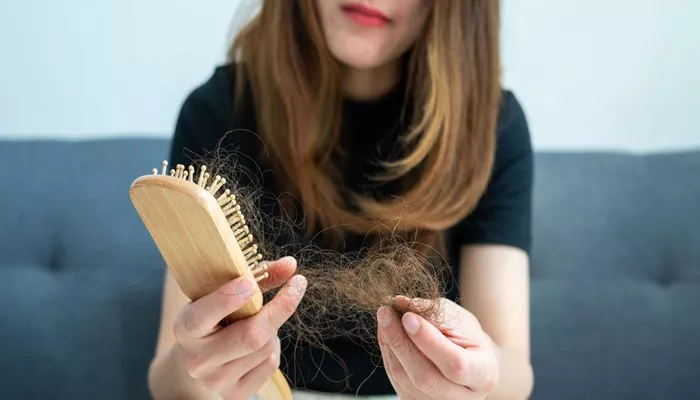Hair loss is a common concern for many individuals, and it can be caused by various factors. One of the more alarming potential causes of hair loss that some people worry about is ovarian cancer. Understanding the connection between hair loss and ovarian cancer is crucial for early detection and appropriate medical intervention.
Understanding Hair Loss
Causes of Hair Loss
Hair loss can result from numerous factors, including genetics, hormonal changes, medical conditions, medications, and lifestyle factors. Common causes include:
Androgenetic Alopecia: Also known as male or female pattern baldness, it is the most common cause of hair loss.
Telogen Effluvium: Stress, surgery, or illness can push hair into the resting phase, leading to shedding.
Alopecia Areata: An autoimmune condition where the body attacks hair follicles.
Medications: Certain drugs, including chemotherapy, can cause hair loss.
Symptoms of Hair Loss
Symptoms vary depending on the cause but commonly include thinning on top of the head, patchy bald spots, and sudden loosening of hair. In some cases, hair loss can affect the entire body.
Ovarian Cancer Overview
What is Ovarian Cancer?
Ovarian cancer is a type of cancer that begins in the ovaries. It often goes undetected until it has spread within the pelvis and abdomen, making it more challenging to treat and more deadly.
Symptoms of Ovarian Cancer
Early-stage ovarian cancer rarely causes symptoms. Advanced-stage ovarian cancer may cause nonspecific symptoms that are often mistaken for more common benign conditions. These symptoms include:
Abdominal Bloating: Persistent bloating and swelling.
Pelvic Pain: Discomfort or pain in the pelvic area.
Difficulty Eating: Feeling full quickly.
Urinary Symptoms: Urgent or frequent urination.
Connection Between Hair Loss and Ovarian Cancer
Direct Connection
Hair loss itself is not typically a direct symptom of ovarian cancer. Unlike cancers that directly affect the scalp or skin, ovarian cancer does not directly cause hair to fall out.
Indirect Connection
Hair loss can occur indirectly due to ovarian cancer through various mechanisms:
Chemotherapy: Treatment for ovarian cancer often involves chemotherapy, which can cause significant hair loss.
Hormonal Changes: Ovarian cancer can disrupt hormone production, leading to hair thinning or loss.
Nutritional Deficiencies: Cancer and its treatment can lead to poor nutrition, affecting hair health.
Chemotherapy and Hair Loss
How Chemotherapy Causes Hair Loss
Chemotherapy targets rapidly dividing cells, including cancer cells. Unfortunately, it also affects other rapidly dividing cells in the body, such as those in hair follicles, leading to hair loss.
Managing Chemotherapy-Induced Hair Loss
Patients undergoing chemotherapy can manage hair loss through various methods:
Scalp Cooling: This technique can reduce the blood flow to the scalp, minimizing hair follicle exposure to chemotherapy.
Wigs and Head Coverings: Many patients opt for wigs, scarves, or hats to cope with hair loss.
Gentle Hair Care: Using mild shampoos and avoiding harsh hair treatments can help manage hair loss.
SEE ALSO: What Are the Diseases That Cause Hair Loss?
Hormonal Changes and Hair Loss
Role of Hormones
Hormones play a significant role in hair growth. Ovarian cancer can disrupt hormone levels, particularly estrogen and testosterone, leading to hair thinning or loss.
Managing Hormonal Hair Loss
Treatments to manage hormone-related hair loss include:
Hormone Replacement Therapy (HRT): This can help balance hormone levels.
Medications: Drugs like minoxidil can promote hair growth.
Diet and Supplements: Ensuring a diet rich in essential nutrients can support hair health.
Nutritional Deficiencies and Hair Loss
Impact of Cancer on Nutrition
Cancer and its treatment can lead to nutritional deficiencies, which can affect hair health. Common deficiencies include iron, zinc, and vitamins A, D, and E.
Improving Nutritional Intake
To combat nutritional deficiencies, patients can:
Consult a Nutritionist: Tailored dietary plans can address specific deficiencies.
Supplements: Taking prescribed supplements can help restore nutrient levels.
Balanced Diet: A diet rich in fruits, vegetables, lean proteins, and whole grains supports overall health.
Psychological Impact of Hair Loss
Emotional Toll
Hair loss can have a profound psychological impact, causing distress, anxiety, and depression. It is often seen as a visible sign of illness, affecting self-esteem and body image.
Coping Strategies
Effective coping strategies include:
Support Groups: Connecting with others experiencing similar issues can provide emotional support.
Therapy: Professional counseling can help patients manage the emotional impact of hair loss.
Positive Reinforcement: Focusing on overall health and well-being can shift the focus away from hair loss.
When to Seek Medical Advice
Persistent Hair Loss
If hair loss is sudden, excessive, or accompanied by other symptoms like abdominal pain or bloating, it is essential to seek medical advice. These could be signs of an underlying condition, including ovarian cancer.
Regular Check-Ups
Regular medical check-ups and screenings are crucial for early detection of ovarian cancer, especially for individuals at higher risk. Early detection significantly improves treatment outcomes.
Conclusion
While hair loss is not a direct symptom of ovarian cancer, it can occur due to the disease’s treatment, hormonal changes, and nutritional deficiencies. Understanding the indirect connection between hair loss and ovarian cancer is essential for patients and healthcare providers. Managing hair loss through appropriate medical treatments, nutritional support, and psychological coping strategies can improve the quality of life for those affected. Regular medical check-ups and awareness of ovarian cancer symptoms are crucial for early detection and effective treatment.

